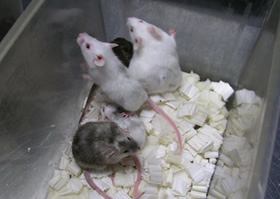Our research

Our biological activities are encoded in a genome. However, these activities do not function without proper control or regulation of genetic information. The epigenetic system is the central mechanism for genome regulation. Of course, the epigenetic system itself is also controlled by genetic information. Thus, genetic and epigenetic systems function interdependently, and we can say that the two systems are "the front and rear wheels of the driving force for our entire set of biological activities." In our laboratory, we aim to elucidate higher-order biological processes controlled by epigenetic mechanisms in order to understand the basis of human health and disease. Chromatin proteins and histones are subjected to post-translational modification by different kinds of enzymes. These enzymatic modifications regulate the chromatin structure and various chromatin-based biological processes. For example, histone lysine methylation (HKM) plays a crucial role in gene expression, DNA repair and replication, chromatin structure/stability, and other processes. We have investigated the molecular mechanisms of HKM and HKM-mediated chromatin functions to elucidate the role of epigenetic gene regulation in various biological processes by using genetically manipulated model mice. We believe that our research will provide novel insights into the basis of human health and disease. Furthermore, we would like to develop new tools for controlling epigenetic regulation systems.



